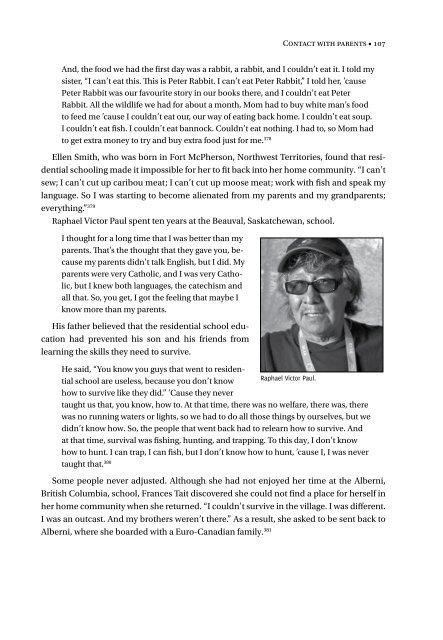The Survivors Speak
1MB8J05
1MB8J05
You also want an ePaper? Increase the reach of your titles
YUMPU automatically turns print PDFs into web optimized ePapers that Google loves.
Contact with parents • 107<br />
And, the food we had the first day was a rabbit, a rabbit, and I couldn’t eat it. I told my<br />
sister, “I can’t eat this. This is Peter Rabbit. I can’t eat Peter Rabbit,” I told her, ’cause<br />
Peter Rabbit was our favourite story in our books there, and I couldn’t eat Peter<br />
Rabbit. All the wildlife we had for about a month, Mom had to buy white man’s food<br />
to feed me ’cause I couldn’t eat our, our way of eating back home. I couldn’t eat soup.<br />
I couldn’t eat fish. I couldn’t eat bannock. Couldn’t eat nothing. I had to, so Mom had<br />
to get extra money to try and buy extra food just for me. 378<br />
Ellen Smith, who was born in Fort McPherson, Northwest Territories, found that residential<br />
schooling made it impossible for her to fit back into her home community. “I can’t<br />
sew; I can’t cut up caribou meat; I can’t cut up moose meat; work with fish and speak my<br />
language. So I was starting to become alienated from my parents and my grandparents;<br />
everything.” 379<br />
Raphael Victor Paul spent ten years at the Beauval, Saskatchewan, school.<br />
I thought for a long time that I was better than my<br />
parents. That’s the thought that they gave you, because<br />
my parents didn’t talk English, but I did. My<br />
parents were very Catholic, and I was very Catholic,<br />
but I knew both languages, the catechism and<br />
all that. So, you get, I got the feeling that maybe I<br />
know more than my parents.<br />
His father believed that the residential school education<br />
had prevented his son and his friends from<br />
learning the skills they need to survive.<br />
He said, “You know you guys that went to residential<br />
school are useless, because you don’t know Raphael Victor Paul.<br />
how to survive like they did.” ’Cause they never<br />
taught us that, you know, how to. At that time, there was no welfare, there was, there<br />
was no running waters or lights, so we had to do all those things by ourselves, but we<br />
didn’t know how. So, the people that went back had to relearn how to survive. And<br />
at that time, survival was fishing, hunting, and trapping. To this day, I don’t know<br />
how to hunt. I can trap, I can fish, but I don’t know how to hunt, ’cause I, I was never<br />
taught that. 380<br />
Some people never adjusted. Although she had not enjoyed her time at the Alberni,<br />
British Columbia, school, Frances Tait discovered she could not find a place for herself in<br />
her home community when she returned. “I couldn’t survive in the village. I was different.<br />
I was an outcast. And my brothers weren’t there.” As a result, she asked to be sent back to<br />
Alberni, where she boarded with a Euro-Canadian family. 381


